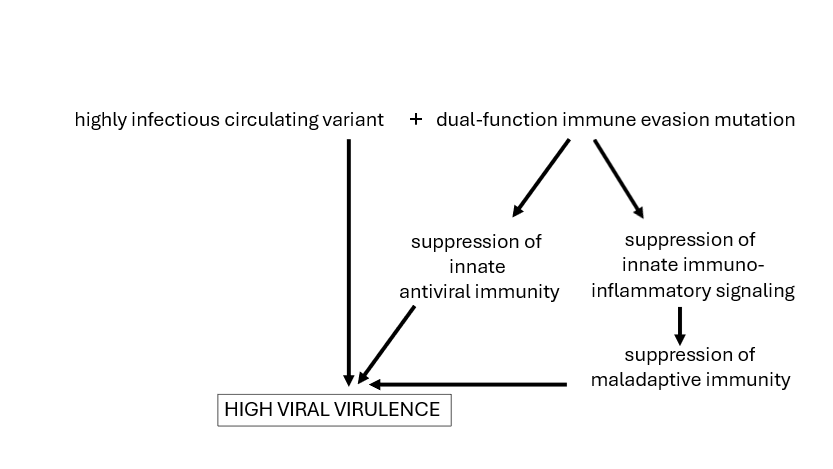 By Independent News Roundup
By Independent News Roundup
Geert Vanden BosscheJun 09, 2025 PST
My warnings about the bleak outcome of this pandemic — which started as a natural event but was turned into a massive in vivo gain-of-function experiment by human intervention — have mostly been met with scorn. Many people think I’m an idiot or a conspiracy theorist. But honestly, I don’t let it get to me too much. I understand that if you haven’t really dug into the complex dynamics of this immune escape pandemic, it’s almost impossible to see that my predictions are actually based on rational, scientific reasoning.
On the flip side, those with whom I feel aligned in terms of mindset and aware of the damage caused by this large-scale interference in population immunity often call me a “visionary”. They seem amazed by how easily they think I can “see the future.” That label, though, because calling it “visionary” kind of downplays all the years of scientific insights, careful reasoning, and hard-earned knowledge behind it.
Voice for Science and Solidarity by Geert Vanden Bossche is a reader-supported publication. To receive new posts and support my work, consider becoming a free or paid subscriber.
In
the past, I used to write (too) long articles, hoping that at least my
peers or public health authorities would understand my reasoning — maybe
even challenge it. Now, I try to keep things more concise. And this is
my final attempt to clearly and as briefly as possible explain where
we’re heading in this ongoing pandemic, and why the current developments
— even though they can’t be reversed — are unfolding painfully slowly,
yet certainly. These days, ChatGPT is a huge help when it comes to
explaining concepts or terms people might not be familiar with or
breaking down scientific jargon, I sometimes assume you already
understand. So please feel free to check with ChatGPT whenever you feel
like I’m skipping steps or making things too dense. Below, I’ve
highlighted in bold the terms that you can easily have ChatGPT define and explain.
I
honestly don’t understand why evolutionary biologists still haven’t
acknowledged the crystal-clear case of SARS-CoV-2 (SC-2) adapting under
population-level immune pressure as a textbook example of one of the
fields they’re supposed to study, i.e., evolutionary ecology! Most of
them have stayed surprisingly quiet about the catastrophic impact of the
large-scale COVID-19 (C-19) vaccination campaign, despite its huge
impact on the dynamics of SC-2 evolution and the host adaptive immune
response. The only conclusion I can draw is that they lack the necessary
background in virology, immunology, and vaccinology to fully grasp how
the immunological landscape in a highly C-19 vaccinated population
affects viral evolutionary dynamics.
About entropy, resilience and chaos…
As a bit of context, I’d first like to point out how this pandemic fits perfectly into today’s broader pattern of entropic, disorder-related events occurring across almost all layers of industrialized societies. To name just a few: disruption, disintegration, discontinuity, disharmony, distortion, displacement, dissonance, distrust, dissent, dysregulation, dysfunction, dystopia, destruction, degeneration, deterioration, degradation, destabilization, decoupling...
However,
disturbances in natural balance don’t necessarily transition into
full-blown chaos or system breakdown. Still, without mechanisms for
adaptation or resilience, there’s a very real risk that systems collapse
— suddenly and irreversibly. Where it is currently most obvious—at
least to me—that we are running out of the ability to adapt or remain
resilient is in the ongoing immune escape pandemic: after 5–6 years of
increasingly disruptive influences — mainly irrational infection-control
measures followed by poorly thought-out mass vaccination — the
population’s immunity has largely lost its ability to effectively adapt
to continued viral immune escape. Once the elastic is stretched to its
limit, there may be no more tension left (hence the current decline in
case numbers and viral spread), but any further traction meets a total
lack of resilience — and the elastic just snaps very suddenly! Given the
current situation and the absence of protective herd immunity, and thus
the lack of control over virus transmission, we have no choice but to
let the pandemic run its course. It’s just a matter of time before the
elastic will snap… and probably not much. I still believe that in this
high-entropy phase of modern civilization, further viral evolution in
highly C-19 vaccinated populations is the most likely factor to trigger
societal collapse. This non-linear collapse would likely prevent the
breakdown of other already-strained systems. This might be the only
positive element in an otherwise bleak scenario.
The evolutionary pathobiology of SC-2: It’s not a never-ending story!
In the context of the currently diminished adaptive immune pressure exerted by highly C-19 vaccinated populations, the (co-)dominance of viral variants is no longer primarily driven by immune escape. Poorly selective immune pressure—e.g., resulting from low-affinity, poorly epitope-specific antibodies and suboptimally functional T cells—slows down viral immune escape, as it fails to strongly favor specific viral variants capable of evading the host immune response. Consequently, newly emerging immune escape variants of SC-2 no longer exhibit a significant competitive fitness advantage, as they do not replicate substantially better than circulating variants. In addition, the broadening of population-level immune pressure requires the virus to accumulate multiple epitope mutations simultaneously to effectively escape host immunity. The generation of such immune escape variants is therefore likely to require more time, particularly in view of the reduced replication advantage and potential fitness costs associated with these accumulated mutations.
In
the absence of significant immune selection pressure, variants with
higher intrinsic infectiousness may leverage this fitness advantage to
dominate via purifying selection, thereby
tending to genetically stabilize the SC-2 landscape by purging immune
escape variants that carry a fitness cost due to harmful mutations.
However, given the immune-mediated reduction in viral load shed by the
reservoir of chronically SC-2 infected individuals—reflected
by low wastewater viral RNA levels—combined with rising summer
temperatures, it is reasonable to assume that highly C-19-vaccinated
population are increasingly facing a transmission bottleneck, despite the enhanced replicative fitness
of newly emerging variants. This may explain why viral variants
currently increasing in prevalence have integrated mutations that
interfere with the host’s innate antiviral defenses, thereby amplifying viral load and shedding, and enhancing their transmissibility.
Although such additional mutations may, in turn, compromise viral
fitness, variants carrying them may exploit this transient transmission
advantage before being eliminated through purifying selection. This is
particularly relevant when considering large bottlenecked or chronically SC-2-infected populations, such as highly C-19–vaccinated cohorts.
Provided
that a newly emerging variant replicates at sufficiently high titers
and harbors 'tolerable' mutations that impair the host’s innate
antiviral immunity—such as those inhibiting or suppressing type I
interferon (IFN) induction (https://x.com/mrmickme2/status/1927515038098620651)—the mutation sampling
effect may become strong enough to allow the virus to exploit a narrow
window of opportunity to overcome the transmission bottleneck. Under
such conditions, even atypical or seemingly disadvantageous mutations
can be positively selected, despite the absence of genuine adaptive
immune selection pressure.
The narrowing of the
immune-mediated SC-2 transmission bottleneck by high environmental
temperatures may already explain why the NB.1.8.1 variant is currently
on the rise in Southeast Asia, leading to a surge in infections and
increased hospitalizations among vulnerable individuals. This
illustrates that even immune escape variants bearing rare
mutations with an intrinsic fitness cost can dominate if they confer a
sufficient transmission advantage—for instance, by weakening or impairing additional key components of the host’s innate immune defense. This enables faster intra-host replication in chronically SC-2-infected individuals and more efficient inter-host
transmission, allowing such variants to outcompete all other intra-host
strains and rapidly rise to dominance in the population.
The dominance of highly infectious and more transmissible variants, as described above, may also explain why infections with the currently circulating strains provoke more pronounced localized viral replication in the upper respiratory tract (URT), often resulting in severe throat inflammation—commonly referred to as ‘razor blade throat.’
However,
as extensively referenced in my online courses, strong inflammatory
signals triggered by enhanced viral replication in the URT upregulate
lectin expression on the surface of URT-patrolling migratory dendritic
cells (DCs), which in turn reduces the replicative fitness of the
transmitted virus. There is little doubt that this innate,
DC-mediated antiviral mechanism will be countered by the emergence of
new variants that not only benefit from the aforementioned transmission
advantage but also incorporate additional mutations that suppress
infection-inhibiting innate immunoinflammatory signaling—e.g.,
through modulation of pattern recognition receptors (PRRs),
co-stimulatory molecules, or pro-inflammatory cytokine responses—that
would normally be triggered by productive viral infection, or
that alternatively modify the viral glycosylation profile to prevent
effective binding of viral glycans to DC-associated lectins.
Even
if such additional mutations compromise viral viability, some of these
newly emerging immune escape variants may evade purifying selection by
achieving transmission before being eliminated, as explained above.
Hence, such newly emerging variants would effectively use currently
(co-)circulating variants—such as NB.1.8.1—as a stepping stone for
further adaptive evolution, enabling the virus to further undermine the
maladaptive immune response that meanwhile prevails in large segments of
highly C-19 vaccinated populations.
If a highly infectious circulating variant acquires such a dual-function immune evasion mutation, it will not only exhibit high replicative and transmission fitness but also evade both innate and adaptive immune responses. This is precisely where I anticipate that highly C-19–vaccinated populations will generate an evolutionary environment conducive to increased viral virulence (see the diagram below). Of course, as the immune forces currently at play are no longer selective, purifying selection is increasingly contributing to the slowdown in the dominant circulation of new immune escape variants. This delay in the evolutionary trajectory of newly emerging immune escape variants toward (co-)dominance leaves public health authorities with the illusory impression that the pandemic is finally transitioning into a stable equilibrium between population-level immunity and the virus—thanks, ostensibly, to the mass vaccination program!!
As explained extensively before, what we are currently witnessing is not a true equilibrium, but rather a metastable one— one that can easily be disrupted by a small additional perturbation (i.e., a few extra mutations, even ones that may be detrimental to viral fitness!), creating just enough added tension to cause sudden destabilization—making the elastic snap and thereby rendering a newly emerging immune escape variant highly virulent!
As I have long warned, “Society in Highly C-19–Vaccinated Countries Will Be Caught by Surprise,” as the rise of increasingly immune-subversive SC-2 variants diverts the attention of the medical community toward all kinds of other infectious and non-infectious diseases—many of which are increasing in prevalence due to vaccine breakthrough infection (VBTI)-associated immune dysregulation. Meanwhile, few anticipate the emergence of a novel, highly infectious, and fully immune-resistant variant that could exploit an enormous transmission advantage, culminating in rapid global dominance and the onset of a new, highly virulent pandemic. Indeed, no one is anticipating such a sudden and dramatic shift in highly C-19 vaccinated populations. The current spread of NB.1.8.1 and the associated rise in disease cases is not yet recognized as the harbinger of this disastrous but inevitable evolution.
If my analysis is correct, one should expect HIghly VIrulent OmiCRON descendants (HI-VI-CRON) to emerge in these highly C-19 vaccinated populations—particularly among individuals with weakened or untrained cell-based innate immunity (i.e., primarily elderly and adult individuals), and especially during the hot season! Summer will therefore reveal whether the title of my book was justified: 'The Inescapable Immune Escape Pandemic'."

In summary:
Beyond the well-documented direct side effects of the mRNA-based
'vaccine' injections, highly vaccinated C-19 populations are now
increasingly witnessing excess mortality due to vaccine-associated
immune dysregulation. This is the result of immune escape, a phenomenon
that, for example, arises from the improper deployment of the immune system’s ‘special forces’ (i.e., B and T cells), such as through mass vaccination during a pandemic, or through improper training of these special forces, such as by using mRNA-based 'vaccines'.
Both
scenarios lead to immune refocusing, which either generates or sustains
immune escape and thereby leads to repeated VBTIs. Due to immune
refocusing, highly C-19 vaccinated populations exert immune pressure on
the virus — initially selective, but ultimately non-selective — causing
viral evolution and the intra-host amplification of new immune escape
variants in chronically SC-2-infected hosts to proceed increasingly
slowly. As a result, inter-host transmission becomes compromised, creating a natural positive selection
among already highly infectious variants for specimens that, due to
harboring mutations which actively suppress or evade innate immune
sensing (e.g. via changes in NSP1, ORF6, or dsRNA processing), acquire increased transmission fitness — even if this comes at a fitness cost (and thus they may be relatively harmless to the unvaccinated population!).
However,
mutations that impair immunoinflammatory signaling, or otherwise
prevent activation of antigen-presenting cells (APCs), inevitably
further weaken the already dysregulated adaptive immunity, which then completely loses its disease-protective function. Together with the compromised innate immunity, this opens the door wide to increased viral virulence.
In Conclusion: As a matter of fact, it seems that undermining the last bastion of the host’s innate immunity has now become a conditio sine qua non
for the virus to enhance transmission and ensure survival in the
population. However, downregulation or impairment of innate
immunoinflammatory signaling or virus uptake by APCs—processes necessary
to prime adaptive immune responses such as T and B cell activation—will
further compromise an already maladaptive immune response. This
response has been massively mobilized and served as the cornerstone of
protection against symptomatic VBTIs, despite all the immune
dysregulation and associated disorders it generated.
It seems, therefore, that viral survival will inevitably be associated with enhanced virulence,
and there is little immune buffer capacity left to delay a spectacular
wave of hyperacute systemic disease in highly C-19 vaccinated
populations.
Although highly compelling, the above-described evolutionary mechanism is unprecedented in the history of clinical virology and underappreciated by our public health authorities. They prefer to learn by watching from the sidelines. This is perhaps the most unbelievable—but real—example of irresponsible behavior from an official authority that should have only one priority: protecting people’s health! Instead, they have orchestrated a large-scale gain-of-function experiment on the human species, leading to convergent evolution of dramatic immune dysregulation and catastrophic viral immune escape.
So, Africa, when your victory is a done deal, it will be up to you to take the lead.

